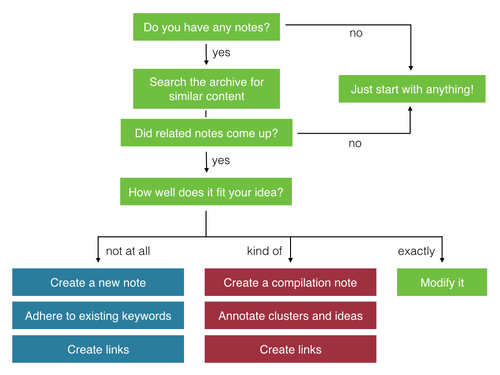Posts from 2016
Zettelkasten Live Ep. 2: Limits of our Zettelkasten Archives
In this episode, we respond to Peter’s question: What do we not put into our archives? Here are a few links for stuff we discussed in the video. Christian’s inspiration for note meta-categories back in the day made him include diary entries. Now they’re out.
Reader Question: Why Not Use a Plain-Text Wiki?
Sujith Abraham asks on YouTube: Why did you choose nvALT, where you have to create manual links so that you can search and find which other notes ‘backlinks’ to other notes, instead of a wiki (like DokuWiki, Tiddlywiki) where this would be provided automatically along with the benefit of plain-text writing/storage.
This Week's Episode Will be Delayed Until Next Week
Sorry, folks, but this week’s episode recording didn’t take place. On Wednesday night I was struck hard by spontaneous and annoying bowel-emptying and I still couldn’t think straight when the scheduled recording would have taken place. I’m feeling a lot better already and we’ll try again next Thursday, Dec. 15th, same time: 16:00 UTC+01.
As always, just shoot your questions and demo requests at us!
Next Zettelkasten Live Episode on Thursday
We’ll be on air this Thursday, 3:00 p.m. UTC. Go to our live stream page on YouTube to see the countdown and localized times.
You’re all welcome to chat with us there on Thursday or leave questions here in advance if you can’t make it.
I set up a public Google Calendar you can look at subscribe to, if you want, although it updates super slow:
Useful resources to subscribe to announcements:
- Our YouTube Live page
- iCal Google Calendar file link
-
The actual calendar source for you to copy and subscribe to in your native calendar apps is this:
webcal://p51-calendars.icloud.com/published/2/fyweJlILTalGxbLZeBcRh1X2t3-fc-dSYwHUUcIbID1elsw8ZBr8reGn8xjVObeIroIVZ5YVQh2KoKMyxTOSYz3shq1_mn6hYLzC2dNgzGw
The Money Is in the Hubs: Johannes Schmidt on Luhmann’s Zettelkasten
Johannes Schmidt gave an awesome lecture but most of you don’t understand German. So I thought I’d give you a quick flash of my notes of some points that I found most important. Keep in mind that this is not a comprehensive overview. Some points are left out or presented with the intention to be more relevant but as a result can be biased.
Zettelkasten Live: the Intro Video
Hello dear friends of knowledge work and knowledge management! – Today we’re thrilled to tell you that our video experiments did bear fruit. We hereby announce the Zettelkasten Live channel. Watch our 10min intro on YouTube.
How to Not Get Lost in a Book

I am a huge proponent of not having any overview. The reason for that is the self-selective nature of the need for an overview. The need for a reasonable amount of overview can become a fetish which not only is not only unnecessary but even harmful for your productivity and creativity. If the need of generating overview for your knowledge archive becomes self-selective, it becomes non-functional and is cancerous to your knowledge system we call a Zettelkasten.
Where Should My Writing Ideas Go?

I managed my writing ideas in a to-do list for years. Since I follow the principles of the Getting Things Done methodology, a book idea was the perfect candidate for a “someday/maybe” project. That’s a project which you can prepare with anything from the top of your head without much real planning. You don’t have to follow-up on it anytime soon if you don’t want and thus defer taking any action until later. You can have ideas now and execute them later, whenever you wish.
Luhmann's Essays on Writing and Using a Zettelkasten are Back Online
After the scriptogr.am shutdown a while ago, Manfred Kuehn’s translations of Luhmann’s essays on note-taking and reading were gone.
Today I found out that “Communicating with Slip Boxes” (which is about a Zettelkasten) and “Learning how to Read” can be found online again at http://luhmann.surge.sh.
I love that the source files are available, too, for anyone to see and edit, at GitHub.
Nassim Taleb would love the Zettelkasten Method

In my opinion, Nassim Taleb’s most important idea is the concept of Antifragility. Here is his three-concept-model: Fragile means that something doesn’t like volatility and variability. In short: It doesn’t like to be touched. If you send something fragile via mail you write fragile on it so to say: Do as little as possible with it.
Fixed Links
I fixed a few broken links on this site, both outgoing and between blog posts. To that end I re-read a few of the older pieces on this site.
Check out these goldies:
- Create a Zettelkasten for your Notes to Improve Thinking and Writing
- The Collector’s Fallacy
- Building Blocks of a Zettelkasten
- The 2 Forms of a Zettel Note
Sascha’s next post is in our extensive review loop already, by the way, so stay tuned.
When Should You Start a New Note?

Say you start with a fresh Zettelkasten or you learn more about an existing topic. You write your note and expand the text – and then you ask yourself this: should I create a new Zettel? Should I split this up? Can I attach this detail there? Finding an answer is pretty easy as the scenarios are limited:
Reading for the Zettelkasten Is Searching

If you work with the Zettelkasten Method you have to deal with a lot of reading. It is obvious that it is often not very obvious what to include into your archive and what not. I chose to create a typology of items to serve me as an epistemiologic amplifier. If you know how things look in general (type) you can find specific items more easily. I struggle a little bit with finding the correct english term. They are not themselves thoughts neither are they Zettel types. There are six of them:
Tag Pages Fixed
I noticed that none of the tag indexes did show articles. Today I fixed this, so you can browse all tags like you should.
Your First Note – Don't Overthink It

The Zettelkasten note archive is the storage of your knowledge. The Zettelkasten Method is an ideation tool, though. Using your Zettelkasten should help remember stuff and spark new ideas which will be stored as Zettel notes again. This process is fruitful and potentially never-ending. All that sounds nice, but naturally you have to start somewhere. How do you start working with your Zettelkasten? What’s the best first note?
Fake Progress
With the help of intentions and promises, he maintains the honest impression that he is moving toward the good, yet all the while he moves farther and farther away from it.
—Søren Kierkegaard
Making decisions isn’t progress. Planning soothes your mind. But it’s a false sense of accomplishment. You still haven’t done anything by then.
Similarily, reading itself isn’t progress. We have learned a bit, but until we process the information, we haven’t yet succeeded.
Remember the Collector’s Fallacy:
‘[T]o know about something’ isn’t the same as ‘knowing something’. Just knowing about a thing is less than superficial since knowing about is merely to be certain of its existence, nothing more. Ultimately, this fake-knowledge is hindering us on our road to true excellence. Until we merge the contents, the information, ideas, and thoughts of other people into our own knowledge, we haven’t really learned a thing. We don’t change ourselves if we don’t learn, so merely filing things away doesn’t lead us anywhere.
Reading is cheap. Reading is easy. Processing notes is hard and time-consuming. But the hard work is the work that matters in the long run.
First Draft from Outline – a Compiler Script
Last week I completed a script to help automate the process of compiling a first draft from an outline and Zettel notes. You can find it on GitHub or install it as a gem from the terminal: gem install zettel_outline. Learn more about the format it supports and how you can adopt it to your Zettelkasten note archive.
Why Luhmann Had to Start a Second Zettelkasten

If you are familiar with the latest research on Luhmann’s original Zettelkasten you already know that his first Zettelkasten is not lost. That’s right: he had two archives over the years. Somehow, a rumor did arise that he lost his first Zettelkasten. It was said that he had to start a new one because of that.